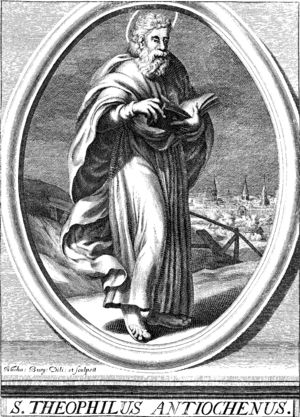Theophilus of Antioch facts for kids
Quick facts for kids SaintTheophilus of Antioch |
|
|---|---|
 |
|
| Apologist and Patriarch of Antioch | |
| Died | 183–185 |
| Venerated in | Catholic Church Eastern Orthodox Church Oriental Orthodoxy |
| Canonized | Pre-congregation |
| Feast | 13 October |
Theophilus (whose name in Greek was Θεόφιλος ὁ Ἀντιοχεύς) was an important early Christian leader. He was the Patriarch of Antioch, a top religious position, from about 169 AD to 182 AD. He likely died between 183 and 185 AD.
Theophilus was born a pagan near the Tigris and Euphrates rivers. He became a Christian by studying the Holy Scriptures, especially the books of the prophets. He was known for defending Christianity against people who tried to change its teachings.
A famous historian named Eusebius said that Theophilus worked hard to protect Christians from false beliefs. He especially fought against the ideas of Marcion, who had different views about Christianity. Theophilus helped develop Christian writing, arguments, and explanations of the Bible.
Contents
Theophilus's Writings
Historians like Eusebius and Jerome wrote about many works by Theophilus. Here are some of them:
- His most famous work, Apology to Autolycus, which still exists today.
- A book against the false teachings of Hermogenes.
- Another book against the ideas of Marcion.
- Some writings for teaching new Christians (catechetical writings).
- Jerome also mentioned reading some notes on the Gospels and the Book of Proverbs. However, Jerome thought these might not have been written by Theophilus himself.
The Apology to Autolycus
The Apology to Autolycus is the only complete work by Theophilus that we still have. He wrote it to a pagan friend named Autolycus. In this book, Theophilus explains and defends the Christian faith. He also shows why pagan beliefs were not true.
Theophilus used the Old Testament to make his points. He argued that the Old Testament books were written long before Greek writings. He believed they were inspired by God. He thought that any truth found in pagan writings was borrowed from Moses and the prophets.
He compared the consistent message of the Bible with the changing ideas of pagan philosophers. He also discussed the creation of the world and humans, as described in the early chapters of Genesis. He contrasted this with the ideas of Greek thinkers like Plato.
Theophilus also included a timeline from Adam to Emperor Marcus Aurelius. This timeline helped him show that the Hebrew prophets lived before the Greek philosophers. This work was likely written between 180 and 192 AD.
He believed that the Sibylline Books were real and inspired. He quoted them to show they agreed with the prophets. Theophilus thought that pagans ignored the Old Testament because they refused to believe in the one true God.
Theophilus believed that pagan religions were just the worship of idols, which were named after dead people. He did agree with pagan writers on one point: that people would be judged and punished after death for their sins.
The Trinity
Theophilus's Apology is very important because it is the earliest known Christian writing to use the word "Trinity" (Greek: trias). This word means "three." He used it to describe God, though not in the exact way we often hear it today (Father, Son, and Holy Spirit).
This way of talking about God helped connect Christian ideas with Greek philosophy. In Greek thought, concepts like Mind (Nous), Word (Logos), and Wisdom (Sophia) were common. Theophilus's use of "Trinity" likely means the word was already in use among Christians before his time.
Life After Death
In his book, Theophilus also wrote about conditional immortality. This means he believed that eternal life is a gift from God, not something everyone automatically has. He also wrote about judgment at a future resurrection.
Chronology
In his third book, Theophilus created a detailed timeline. It started "from the foundation of the world" and went up to Emperor Marcus Aurelius. Theophilus lived during this emperor's rule. His timeline suggested that the world was created around 5529 BC. He used this timeline to show that Moses and other Hebrew prophets lived before the Greek philosophers.
See also
 In Spanish: Teófilo de Antioquía para niños
In Spanish: Teófilo de Antioquía para niños
 | Jackie Robinson |
 | Jack Johnson |
 | Althea Gibson |
 | Arthur Ashe |
 | Muhammad Ali |

